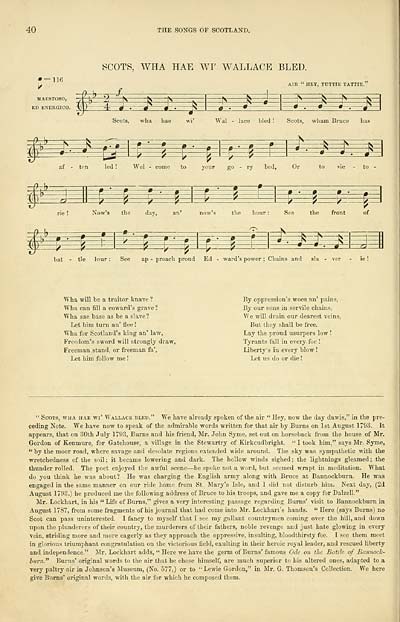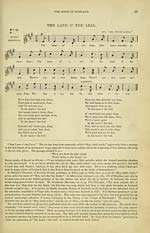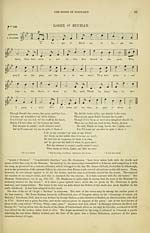Glen Collection of printed music > Printed music > Wood's edition of the songs of Scotland
(64) Page 40 - Scots, wha hae wi' Wallace bled
Download files
Complete book:
Individual page:
Thumbnail gallery: Grid view | List view

40
THE SONGS OF SCOTLAND.
• = 116
V
MAESTOSO,
ED ENEItGICO
SCOTS, WHA HAE WI' WALLACE BLED.
tixz^
. m
AIR " IIEY, TUTTIE TATTIE.
==^=*=n=iHEiEE=3s= —m— — • — •-• — * •—. — **
Scots, wha hae wi' Wal - lace bled ! Scots, wham Bruce ha9
\
^ai^^
g^p^
£=£EE!E
af - ten led ! Wei - come to your go - ry bed, Or to vie - to
3^?
ft
_
wm^m
Now's the day, an'
now's the hour : See the front of
i—r-
e*
3fe
p£^£
$=s
m^
..a
V=^
bat - tie lour : See ap - proaeh proud Ed - ward's power ; Chains and sla - ver - ie !
Wha will be a traitor knave ?
Wha ean fill a coward's grave ?
Wha sae base as be a slave?
Let him turn an' flee !
Wha for Scotland's ldug an' law,
Freedom's sword will strongly draw,
Freeman stand, or freeman fa',
Let him follow me !
By oppression's woes an' pains,
By our sons in servile chains,
W e will drain our dearest veins,
But they shall be free.
Lay the proud usurpers low !
Tyrants fall in every foe !
Liberty's in every blow !
Let us do or die !
" Scots, wha hae wi' Wallace bleu." We have already spoken of the air " Hey, now the day dawis," in the pre-
ceding Note. We have now to speak of the admirable words written for that air by Burns on 1st August 1793. It
appears, that on 30th July 1793, Burns and his friend, Mr. John Syme, set out on horseback from the house of Mr.
Gordon of Kenmure, for Gatehouse, a village in the Stewartry of Kirkcudbright. " I took him," says Mr. Syme,
" by the moor road, where savage and desolate regions extended wide around. The sky was sympathetic with the
wretchedness of the soil ; it became lowering and dark. The hollow winds sighed ; the lightnings gleamed ; the
thunder rolled. The poet enjoyed the awful scene — he spoke not a word, but seemed wrapt in meditation. What
do you think he was about? He was charging the English army along with Bruce at Bannockburn. He was
engaged in the same manner on our ride home from St. Mary's Isle, and I did not disturb him. Next day, (2d
August 1733,) he produced me the following address of Bruce to his troops, and gave me a copy for Dalzell."
Mr. Lockhart, in his " Life of Burns," gives a very interesting passage regarding Burns' visit to Bannockburn in
August 1787, from some fragments of his journal that had come into Mr. Lockhart's hands. " Here (says Burns) no
Scot can pass uninterested. I fancy to myself that I see my gallant countrymen coming over the hill, and down
upon the plunderers of their country, the murderers of their fathers, noble revenge and just hate glowing in every
vein, striding more and more eagerly as they approach the oppressive, insulting, bloodthirsty foe. I see them meet
in glorious triumphant congratulation on the victorious field, exulting in their heroic royal leader, and rescued liberty
and independence." Mr. Lockhart adds, " Here we have the germ of Burns' famous Ode on the Battle of Bannock-
burn." Burns' original words to the air that he chose himself, are much superior to his altered ones, adapted to a
very paltry nir in Johnson's Museum, (No. 577,) or to "Lewie Gordon," in Mr. G. Thomson's Collection. We here
give Burns' original words, with the air for which he composed them.
THE SONGS OF SCOTLAND.
• = 116
V
MAESTOSO,
ED ENEItGICO
SCOTS, WHA HAE WI' WALLACE BLED.
tixz^
. m
AIR " IIEY, TUTTIE TATTIE.
==^=*=n=iHEiEE=3s= —m— — • — •-• — * •—. — **
Scots, wha hae wi' Wal - lace bled ! Scots, wham Bruce ha9
\
^ai^^
g^p^
£=£EE!E
af - ten led ! Wei - come to your go - ry bed, Or to vie - to
3^?
ft
_
wm^m
Now's the day, an'
now's the hour : See the front of
i—r-
e*
3fe
p£^£
$=s
m^
..a
V=^
bat - tie lour : See ap - proaeh proud Ed - ward's power ; Chains and sla - ver - ie !
Wha will be a traitor knave ?
Wha ean fill a coward's grave ?
Wha sae base as be a slave?
Let him turn an' flee !
Wha for Scotland's ldug an' law,
Freedom's sword will strongly draw,
Freeman stand, or freeman fa',
Let him follow me !
By oppression's woes an' pains,
By our sons in servile chains,
W e will drain our dearest veins,
But they shall be free.
Lay the proud usurpers low !
Tyrants fall in every foe !
Liberty's in every blow !
Let us do or die !
" Scots, wha hae wi' Wallace bleu." We have already spoken of the air " Hey, now the day dawis," in the pre-
ceding Note. We have now to speak of the admirable words written for that air by Burns on 1st August 1793. It
appears, that on 30th July 1793, Burns and his friend, Mr. John Syme, set out on horseback from the house of Mr.
Gordon of Kenmure, for Gatehouse, a village in the Stewartry of Kirkcudbright. " I took him," says Mr. Syme,
" by the moor road, where savage and desolate regions extended wide around. The sky was sympathetic with the
wretchedness of the soil ; it became lowering and dark. The hollow winds sighed ; the lightnings gleamed ; the
thunder rolled. The poet enjoyed the awful scene — he spoke not a word, but seemed wrapt in meditation. What
do you think he was about? He was charging the English army along with Bruce at Bannockburn. He was
engaged in the same manner on our ride home from St. Mary's Isle, and I did not disturb him. Next day, (2d
August 1733,) he produced me the following address of Bruce to his troops, and gave me a copy for Dalzell."
Mr. Lockhart, in his " Life of Burns," gives a very interesting passage regarding Burns' visit to Bannockburn in
August 1787, from some fragments of his journal that had come into Mr. Lockhart's hands. " Here (says Burns) no
Scot can pass uninterested. I fancy to myself that I see my gallant countrymen coming over the hill, and down
upon the plunderers of their country, the murderers of their fathers, noble revenge and just hate glowing in every
vein, striding more and more eagerly as they approach the oppressive, insulting, bloodthirsty foe. I see them meet
in glorious triumphant congratulation on the victorious field, exulting in their heroic royal leader, and rescued liberty
and independence." Mr. Lockhart adds, " Here we have the germ of Burns' famous Ode on the Battle of Bannock-
burn." Burns' original words to the air that he chose himself, are much superior to his altered ones, adapted to a
very paltry nir in Johnson's Museum, (No. 577,) or to "Lewie Gordon," in Mr. G. Thomson's Collection. We here
give Burns' original words, with the air for which he composed them.
Set display mode to: Large image | Transcription
Images and transcriptions on this page, including medium image downloads, may be used under the Creative Commons Attribution 4.0 International Licence unless otherwise stated. ![]()
| Special collections of printed music > Glen Collection of printed music > Printed music > Wood's edition of the songs of Scotland > (64) Page 40 - Scots, wha hae wi' Wallace bled |
|---|
| Permanent URL | https://digital.nls.uk/91338511 |
|---|
| Description | Scottish songs and music of the 18th and early 19th centuries, including music for the Highland bagpipe. These are selected items from the collection of John Glen (1833 to 1904). Also includes a few manuscripts, some treatises, and other books on the subject. |
|---|
| Description | The Glen Collection and the Inglis Collection represent mainly 18th and 19th century Scottish music, including Scottish songs. The collections of Berlioz and Verdi collected by bibliographer Cecil Hopkinson contain contemporary and later editions of the works of the two composers Berlioz and Verdi. |
|---|

